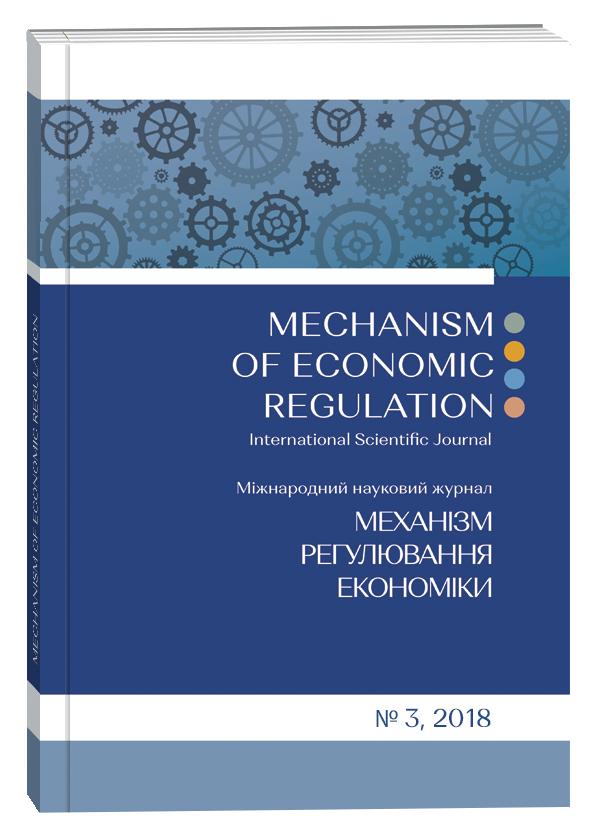ВПЛИВ ЛЮДСЬКОГО КАПІТАЛУ ТА ІННОВАЦІЙНО-ІНВЕСТИЦІЙНИХ ПОКАЗНИКІВ НА ЕКОЛОГО-ЕКОНОМІЧНУ ЕФЕКТИВНІСТЬ НАЦІОНАЛЬНИХ ЕКОНОМІК
Анотація
Статтю присвячено економічному обґрунтуванню та математичному опису взаємозв’язків між рівнем людського капіталу, інноваційною діяльністю в країні та еколого-економічною ефективністю її економіки. Вивченню основних факторів збалансованого економічного зростання з урахуванням екологічних обмежень приділяється все більше уваги під час моделювання сценаріїв розвитку окремої національної економіки, виявлення причин міждержавних різниць у рівні життя та поступового збільшення розриву у рівні добробуту між розвиненими країнами та країнами, що розвиваються. З урахуванням теоретичних напрацювань зарубіжних і вітчизняних вчених, присвячених феномену науково-технічного прогресу та формуванню економіки знань, відзначена роль процесу накопичення людського капіталу та використання інформаційних ресурсів у розвитку соціально-економічних систем. На основі аналізу панельних даних щодо 58 економік світу з економічними системами різного рівня розвитку досліджено характер впливу людського капіталу та інноваційно-інвестиційних процесів на ефективність їхнього національного господарства. Зазначено, що країни світу знаходяться не на одному рівні розвитку, тому вплив людського капіталу та інноваційно-інвестиційних показників національних економік мають різний ступінь еколого-економічної ефективності. У роботі запропоновано поділити країни світу на групи відповідно до рівня їх забезпеченості факторами НТП. У статті встановлено, що при зростанні інвестицій на одного працюючого на 1 дол. США відбувається трикратне зростання ВВП на одного працюючого, останнє підтверджує гіпотезу мультиплікативного ефекту інвестицій. Додатково запропоновано підхід до аналізу економічних систем із виділенням їхніх кластерів. За результатами дослідження оптимальними для всіх груп країн визначені моделі з фіксованими індивідуальними ефектами, які дозволяють враховувати їхні істотні індивідуальні особливості.
Посилання
Acemoglu, D. Directed technical change / D. Acemoglu // Review of economic research. – 2002. – Volume 69. – Number 4. – P. 781–809.
Aghion, P. Competition and Innovation: Inverted Communication / Aghion, P., Bloom, N., Blundell, R., Groffit, R., Howit, P. // Quarterly Journal of Economics. – 2005. – Volume 120. – Р. 701–728.
Aghion, P. Growth, distance to the border and consumption of human capital [Electronic resource] /
P. Aghion, Yu. Vandenbushche, S. Megir. – 2004. – P. 150. – Accessed mode : http://www.economics.harvard.edu/faculty/aghion/files/distance_to_frontier.p.
Akomak, S. Social Capital, Innovation and Growth: Evidence from Europe / S. Akomak, B. Vail // European Economic Review. – 2009. – Volume 53. – Р. 544–567.
Barro, R. Economic Growth in the Cross-Section of Countries / R. Barro // Quarterly Journal of Economics. – 1991. – Volume 106. – Р. 407–443.
Lucas, R. Understanding business cycles / R. Lucas // Paper prepared for the Kiel Conference on Growth without Inflation. – 1976. – Р. 22–23.
Romer, P. Endogenous Technological Change / P. Romer // Journal of Political Economy. – 1990. – Vol. 98(5). – P. 71–102.
Stern, D. I. Economic Growth and Energy / D. I. Stern // Encyclopedia of Energy. – 2011. – Vol. 2. – P. 35–51.
Schumpeter, J. Capitalism, Socialism and Democracy / J. Schumpeter. – 1954. – 3rd ed. – New York : Harper and Row, 1954.
Tsikon, A. Human Capital, Structure of Production and Growth / A. Tsikon, E. Papayoannu // Review of Economics and Statistics. – 2009. – Volume 91. – P. 66–82.
Бажал, Ю. М. Інноваційна теорія економічного розвитку: М. Туган-Барановський, Й. Шумпетер і проблеми перехідної економіки України / Ю. М. Бажал // Наукові записки НАУКМА. − 2000. − Т. 18. Економічні науки. – С. 3–7.
Моїсеев, А. Оптимальні та збалансовані траєкторії в моделях економічного зростання з ендогенною формою НТП / А. Моїсеев // Актуальні питання економіко-математичного моделювання: Зб. наук. роботи кафедри ММАЭ Економічного факультету МГУ / за заг. ред. М. В. Грачевої. – М. : ТЕИС, 2004. – С. 178–190.


